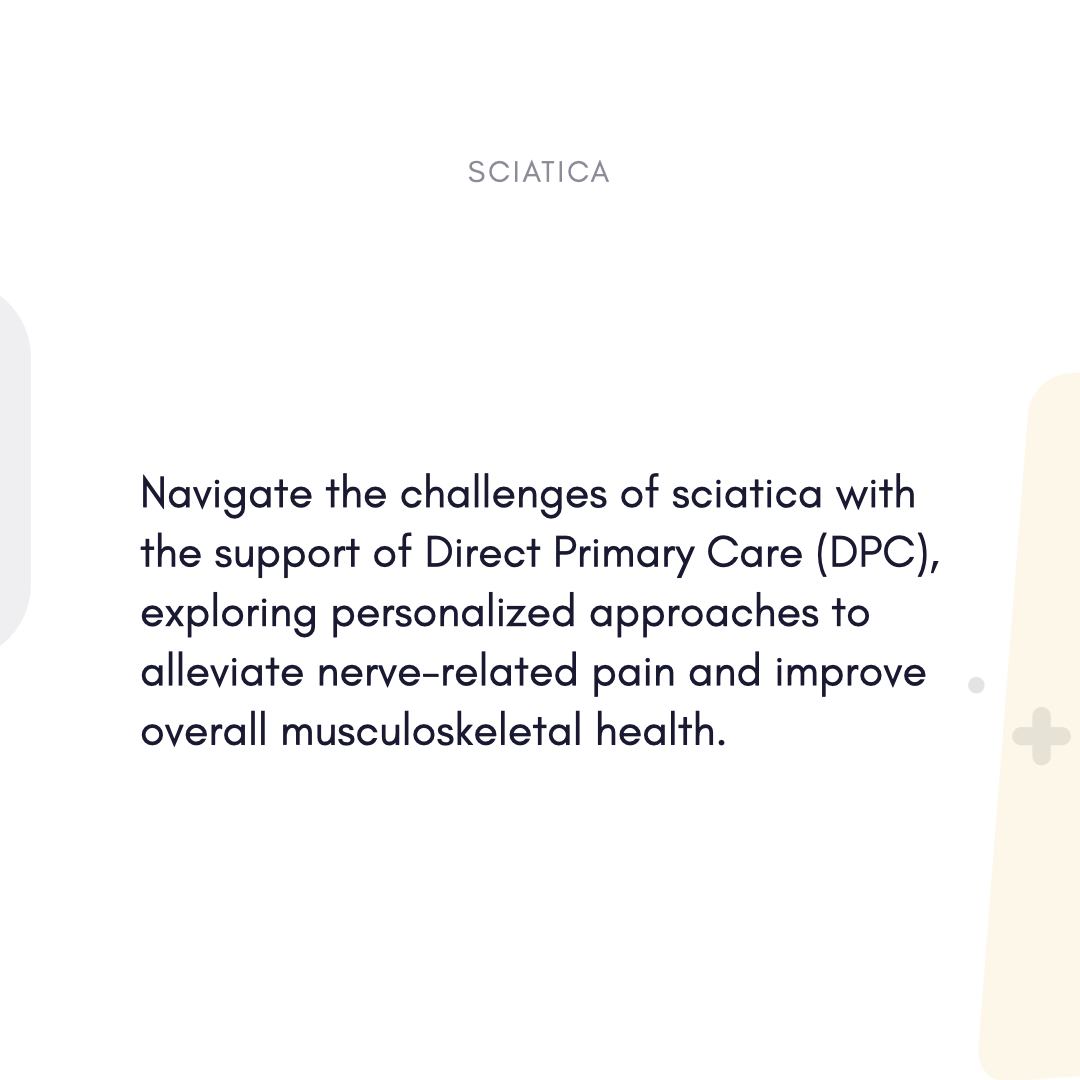Sciatica and Direct Primary Care (DPC): Targeted Relief for Radiating Nerve Pain
A flaming agony shooting down your leg. Numb toes that could make driving dangerous. For forty percent of adults with sciatica, this nerve compression represents life on hold rather than only discomfort. Although conventional treatment sometimes postpones MRIs or pushes pills, Direct Primary Care (DPC) offers exact, proactive treatment to relieve pressure on your sciatic nerve.

Comprehending Sciatica
Compression of the sciatic nerve (L4-S3) results in sciatica and causes:
- Radiating lower back to foot pain
- Leg or foot tingling or numbing
- Weakness in the muscles of legs
Common reasons:
- 90% of cases represent a herniated disc.
- Piliformis syndrome, spinal stenosis
- Spondylisthesis
Treated risks: Foot drop, cauda equina syndrome, long-term pain Early imaging and conservative treatment advice from the American Academy of Orthopaedic Surgeons
How DPC Changes Treating Sciatica
Operating on a membership model usually 50 USD–150 USD/month, Direct Primary Care (DPC) provides unlimited access to your physician for a set fee. For those with sciatica, this means no prior authorization, no co-pays, and a care plan as exact as your pain.
1. Imaging and a fast diagnosis
The easily available DPC model guarantees:
- Same-day straight leg raises and neurologic tests.
- Affordable MRI: 400 USD lumbar spine scan cash-pay instead of 2,500 USD.
- Rule out peripheral neuropathy; coordinate EMG.
2. Customized, Guideline-Driven Treatment
DPC doctors design customized programs compliant with spine society guidelines:
- NSAIDs, muscle relaxants, epidural steroid injections form acute phase.
- PT for nerve gliding exercises and core strengthening in a rehab phase.
- Referrals for microdiscectomy should arise from conservative approaches failing.
3. Complete, reasonably priced assistance
DPC lowers physical and financial burden by:
- Cutting prescription costs: gabapentin or meloxicam wholesale pricing.
- 24/7 telehealth access allows one to control medication side effects or flare-ups.
- Preventive education: correct ergonomic changes, lifting techniques.
DPC Benefits for Sciatica Patients
1. Unmatched Availability
- 24/7 consultations for bowel/bladder problems or sudden weakness (cauda equina).
- No wait for imaging or PT referrals.
2. Individualized Interventions
- Disc herniation: McKenzie works on traction.
- Stretching exercises and trigger point injections address Piriformis syndrome.
3. Open Cost: Affordability
- Included are consultations, imaging reviews, and care coordination under membership.
- Typical savings: 3,000 USD+ by skipping needless procedures and ER trips.
Personal Success Stories from Real Life
- Case 1: Using DPC's epidural injection and six-week PT, Sarah, 38, skipped surgery. Back to running toward a marathon.
- Case 2: James, 55, with spinal stenosis, recovered mobility with DPC-coordinated decompression surgery.
Ask questions about DPC and sciatica.
- Q: DPC can treat emergency cauda equina syndrome?
- A: Absolutely. DPC physicians schedule same-day MRI and neurosurgery consultations.
- Q: Without insurance, is DPC reasonably priced?
- A: Indeed. Members save MRIs and PT (50 USD/session against 150 USD).
- Q: Regarding alternative therapies, what?
- A: DPC combines, if desired, chiropractic, yoga, or acupuncture treatment.
Why DPC Wins for Sciatica Patients?
Emphasizing DPC's alignment with care standards, the North American Spine Society supports:
- Precision: Customizing treatments to root causes (disc rather than stenosis).
- Tools to monitor pain levels and rehab progress empower you.
- Trust: A team that is consistent replaces scattered, impersonal treatment.
Retrain Your Mobility to Minish Your Pain
Sciatica need not keep you disabled. Every step of the way, DPC helps you to find a partner who diagnoses correctly, treats holistically, and walks with you toward relief.






